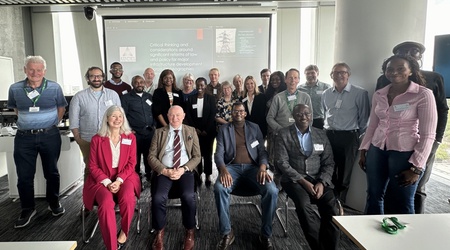On Thursday, 18 July 2024, the Aberdeen University Centre for Energy Law hosted the workshop "Giant Pylons in NE Scotland, Why Here, Why Now and What Next?" bringing together academics across diverse fields, legal professionals, civil societies, and local community to examine the complexities surrounding the construction of pylons in the North East Scotland.
The workshop, featuring three distinct segments opened with an overview of the central theme by Prof Greg Gordon (Head of the School of Law). This was followed by facilitative discussions from sectoral experts, who provided planning and regulatory contexts to pylon infrastructures. In this segment, Andrew Walters, a seasoned Town Planning expert and Doctoral Researcher at the University’s School of Law shared insights on law and policy reform for major infrastructural developments, while Emma Paton, a legal practitioner from Burness Paull, discussed existing regulatory frameworks governing large-scale infrastructure projects such as pylons.
In the second part of the workshop, participants were grouped into different rotating clusters chaired by Prof Abbe Brown, Neil Curtis, Andrew Walters and Jeremy Anbech-Evans as expert facilitators, for in-depth deliberations on matters such as the fragility of the Scottish landscape, tension between national policy and local impact, the net zero context and law and policy reform. Gillian Needham, Chair of the NESCAN (Northeast Scotland Climate Action Network) Hub, along with representatives from Deeside Against Pylons, Steve Allen and Mark Ansell, shared perspectives on climate impacts and the concerns of local communities directly affected by the project, highlighting health impacts, potential property devaluation, and landscape distortion among others. Dr Eddy Wifa chaired an audience engagement session to wrap-up the segment.
Prof Anne-Michelle Slater, lead event organiser, chaired the closing session, highlighting key points from the discussions, and identifying potential steps for navigating social, economic, and legal complexities relating to the central theme of the event.
By fostering open dialogue among experts, civil societies and communities directly impacted by large-scale infrastructures, the event enabled holistic consideration of the multifaceted issues surrounding pylon installations in the North East of Scotland.


